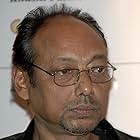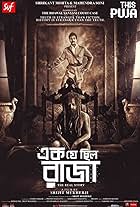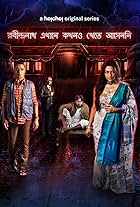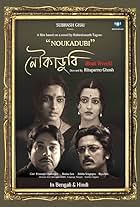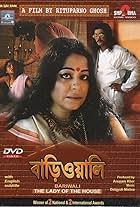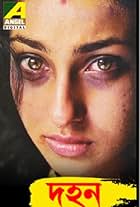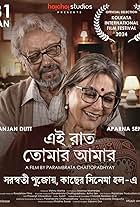रवींद्रनाथ टैगोर के क्लासिक उपन्यास की एक आधुनिक कहानी को दर्शाती है. यह कहानी सिर्फ़ रोमांस ही नहीं लोगों के अलग विचारधाराओं को भी दर्शाती है.रवींद्रनाथ टैगोर के क्लासिक उपन्यास की एक आधुनिक कहानी को दर्शाती है. यह कहानी सिर्फ़ रोमांस ही नहीं लोगों के अलग विचारधाराओं को भी दर्शाती है.रवींद्रनाथ टैगोर के क्लासिक उपन्यास की एक आधुनिक कहानी को दर्शाती है. यह कहानी सिर्फ़ रोमांस ही नहीं लोगों के अलग विचारधाराओं को भी दर्शाती है.
- पुरस्कार
- 1 जीत और कुल 9 नामांकन
फ़ीचर्ड समीक्षाएं
To be honest i expected more from this movie especially after watching satijat rays Version. Its difficult to describe it, but his version felt more ,, complete''.
This movie was somehow unrealistic, like which upper caste male (brahman in this case)decides to marry a former servant from the dalit caste? apart from that its highely critical that a tribal girl is shown as,,tamed'' and brahmanized and pictured as a good will project of nikhels mother and its morally questionable from nikhils side to marry a Dalit to highlight his liberal worldview. i mean come on.
Maybe thats the reason i couldnt connect to the characters at all, the whole movie felt like out of reality and addressed in my eyes a certain ,, intellectual'' group ( which might not be bad, but the movies topic is more than relevant today in indians society, and should be presented to a wider audience)and aparna sen was able to reach a wider publicum with mr&mrs iyer, which also dealed with a similar topic.
Another point i want to adress is the flat character development of sandip, he is shown as the bad guy driven only by greed for power and immorality. In rays version he appeared far more nuanced ,this also applies to nikhils character. And lastly the death of the muslim boy, which leads to a change in the thinking of his hindu nationalistic friend and adjoining vigils, feels rushed and out of place. It appears like a cheap solution to finish quickly the movie.Apart from this weaknesses it was a decent movie, addressing an important issue.
What happened to Aparna Sen? My hopes were set high by the choice of the relevant political issues and, of course, the fact that this is an adaptation of the fascinating Tagore novel. Why did you need to ruin the novel by doing this? The film throws away its potentials through undeveloped, unnecessary subplots. And the actress is just not up to the mark. A film on such a burning issue ought to have been much more responsible. Et tu, Aparna!
''And they lived Happily ever after.....''
Well this didn't apply to the life of Sandeep, Bimla (a.k.a Brinda) and Nikhilesh Choudhary. Directed by Padma Shri and National Award winner, Aparna Sen - Ghawre Baire Aaj is truly a cinematic experience to its utmost supremacy. A modern retelling of the Tagore's novel, "Ghawre Bairey" it is a story of Love, Friendship, Illusion, Truth and above all "Clashing Idologies"
Story :
The Tagore's Ghawre Bairey deals with a complex love triangle of Nikhilesh, his wife Bimla and his friend Sandip. Bimla - who has never known any other man except her husband, realises that there is a perplexing emotions of her relations with Sandip. The film explores the emotional upheaval attached to this Love triangle. It is a socio-political drama which hit the thetre yesterday and a film which you should definitely go and watch.
Now, I was going to give a review when I saw that the film has a got a lot of negative reviews all over the internet. So, I have decided that I will tell you some reasons which I have liked and disliked in the movie and then I will leave it to you.
REASONS TO WATCH THE MOVIE :
1. Brinda's Story- The film has given Brinda a new dimension. The film tells her past. The film starts with Brinda addressing the audience, a snippet of childhood as how she happened to be this little skinny girl who happened to run around in the fields of Jharia till one day her parents died and she was taken to her Amma's (grand ma's) place in Delhi where she used to work as a Nanny in Nikhilesh's place. There she was brought up as their own daughter and then again we are brought to today's time when she tells us that she works as proof reader at the Oxford press and married to Nikhilesh. Although they have a huge age gap, they still share a very healthy relationship and Brinda respects a Nikhilesh a lot for the person he is.
2. Clashing Ideologies leading to change of Equation-
Nikhilesh and Sandeep were childhood friends. They went to the same school and college. 20 years after their college, we see Nikhilesh is an editor of a digital newspaper called India Online and his friend Sandeep is an aspiring right-wing politician who wants to establish India as a Hindu Nation. Sandeep, who was a leftist in his collge days today turned into a right wing nationalist due to a chain of events that happened in the film and that has been shown by the director with brilliance.
3. The modernised adaptation- What was shown by Tagore and Ray was a pre-independence problem, " Swadeshi Movement" Although we have all read in our History books that Swadeshi Movement eventually lead to the Brits leaving India but we don't know what were the sufferings of the poor shopkeepers had been during those days. We get to see that from Nikhlesh's eyes in Ghawre Baire . Although Ghawre baire Aaj tells a completely different story. It tells us about the Hindu Muslim conflicts, the poverty of the Bastar region and a conflict of opinions regarding a dispute piece of land in Bastar. While Nikhilesh and his people wanted to make a Hospital out there for the poor and under privileged of that area, Sandeep and his party wanted to make a Temple. The conflict is also between a man who acts because the action is profitable (Sandip) and one who acts only when it is good (NIkhilesh)
4. Nostalgia- Anirban Bhattacharya, @JisshuSengupta and @TuhinaDas in the lead and @AnjanDutt and Rwitobroto Mukherjee in key roles this film surely triggers nostalgia.
WHAT I DISLIKED ABOUT THE FILM WAS :
The film finds itself burdened by the heavy conflict between its political ideology and the human drama. The scene of Brinda's observation of Sandip, wondering "if only Nikhilesh spoke as passionately", becomes an allegory on the current world seduced by leaders that are brash in speech and direct in action, often to distressing effect. Yet, on the screen, the scenes play on with staid effect. I personally think, Aparna Sen would have done better to focus on the human drama and let the politics evolve through it.
Talking about the acting. Every one has portrayed their character in the bestest way possible. Kudos to Tuhina Das for her work is something I have truly become a fan of. Nevertheless, all the other actors did equally well. Not worthy of these much of negative reviews. Must Watch if you are a Movie Lover.
Talking about the acting. Every one has portrayed their character in the bestest way possible. Kudos to Tuhina Das for her work is something I have truly become a fan of. Nevertheless, all the other actors did equally well. Not worthy of these much of negative reviews. Must Watch if you are a Movie Lover.
Ghawre Baire Aaj - is the modern and contemporary adaptation of Rabindranath Tagore's original "Ghare Baire" helmed by Aparna Sen. It is intended to highlight a clash of ideologies of the liberals who believe in the secular India and the hardline right wing Hindus, a subject of much deliberation these days, and hence quite pertinent. Nikhilesh (Anirban Bhattacharya) is the face of the traditional believer of the original identity of the secular nation, preaching and practicing liberalism whilst dedicating himself to social causes. In contrast, Sandeep Jha (Jishu Sengupta) is the hardliner aspiring to be a Rajya Sabha member ready to pull down all full stops to achieve his goals, ruthless, scheming and agenda driven. Between the two childhood friends who coexist in a repressed and untold friction is Brinda (Tuhina Das), the young wife of the former, who unfortunately turns out to be a chessboard pawn in the game of oneupmanship, being used to establish supremacy without her knowledge. The consequences are diabolical and the fire will consume everyone, seemingly a metaphorical representation of what the director believes will be the outcome of the current chasm. Quite possible!
The trio produce a scintillating performance and Anirban in particular must be complimented for an exceptional rendition of Nikhilesh. It's a well nuanced essay that firmly establishes him in the league of the industry's top tier. The adaptation of the novel however, fails to upraise the battle of ideologies to a flashpoint, avoiding direct confrontation. It is kept at a symbolic and indirect exchange of views and that, in my opinion is an opportunity lost to cascade the message. Brinda's character has been designed as brittle too, who at the first available opportunity jumps into infidelity without any remorse and the director provides a meek justification for her actions. Upon being spurned, she immediately terms her dalliance an infatuation, which seemed like an unlikely end to the strong extramarital relationship and being a transformed protege to Sandeep. The film also shows hardliners more as power hungry conspirators than believers of the right wing ideology, which needn't be the case though - after all hardliners exist because they may believe in their cause too.
The trio produce a scintillating performance and Anirban in particular must be complimented for an exceptional rendition of Nikhilesh. It's a well nuanced essay that firmly establishes him in the league of the industry's top tier. The adaptation of the novel however, fails to upraise the battle of ideologies to a flashpoint, avoiding direct confrontation. It is kept at a symbolic and indirect exchange of views and that, in my opinion is an opportunity lost to cascade the message. Brinda's character has been designed as brittle too, who at the first available opportunity jumps into infidelity without any remorse and the director provides a meek justification for her actions. Upon being spurned, she immediately terms her dalliance an infatuation, which seemed like an unlikely end to the strong extramarital relationship and being a transformed protege to Sandeep. The film also shows hardliners more as power hungry conspirators than believers of the right wing ideology, which needn't be the case though - after all hardliners exist because they may believe in their cause too.
This is an interpretation of Tagore's story set in the India of 2019 where buoyed by political forces, a large part of the population has experienced a renewed recognition of their religious identity. If you have seen the original Ray classic, this film is bound to get you at least interested. Some of the incidents shown don't come across as strong plot-builders and more as half-hearted attempts to build the central characters. Art direction is wonderful, and is able to transport you into the fabled life of Delhi's intelligentsia. Tuhina's performance never slips, and Anirban is pretty solid. It is the more seasoned Jisshu Sengupta who is unconvincing at times, especially because lots of viewers have Soumitra's performance in the Ray film in mind, and this character is not one-track at all. While your mind does wander to Ray's classic several times during the film, the end does hit you and wraps up the film pretty well. There is inspiration from Painted Veil and the Gauri Lankesh incident (Sen dedicates the film to the social activist). Definitely not Sen's best directorial effort.
कहानी
टॉप पसंद
रेटिंग देने के लिए साइन-इन करें और वैयक्तिकृत सुझावों के लिए वॉचलिस्ट करें
विवरण
- रिलीज़ की तारीख़
- कंट्री ऑफ़ ओरिजिन
- आधिकारिक साइट
- भाषा
- इस रूप में भी जाना जाता है
- Ghawre Bairey Aaj
- उत्पादन कंपनी
- IMDbPro पर और कंपनी क्रेडिट देखें
- चलने की अवधि2 घंटे 26 मिनट
- रंग
इस पेज में योगदान दें
किसी बदलाव का सुझाव दें या अनुपलब्ध कॉन्टेंट जोड़ें







